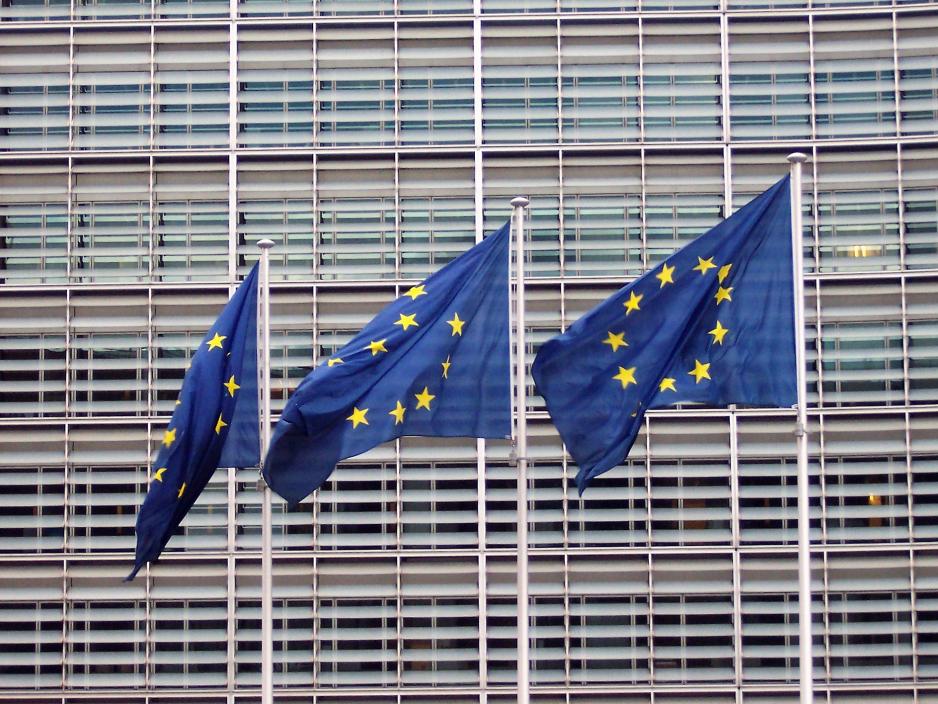EU Importers Preparing to Implement March 2025 Transshipment Ban for Russian LNG

Flags in front of the European Commission building in Brussels. (Source: TeaMeister under CC BY-NC 2.0 DEED)
With the EU’s sanctions on the transfer of Russian LNG just three months away operators in France and Belgium are putting in place procedures to now longer conduct transshipments. The upcoming ban affects around 20 percent of Russian LNG from the Arctic.
Several major LNG importers at French and Belgian terminals have put in place policies to begin complying with measures from the EU’s 14th sanctions package. An EU-wide transshipment ban – banning the transfer of Russian chilled gas via European terminals – will take effect in March 2025. The policy is aimed at complicating Russia’s ability to export LNG to third countries, especially in Asia. Currently around 20 percent of LNG from Novatek’s Arctic Yamal LNG project passes through the EU before being re-exported.
Belgian operator Fluxys, which runs the Zeebrugge terminal, announced that it will be fully compliant with the new rules starting on March 26th. The company signed a 20-year transshipment contract for up to 8 million tons of LNG for Novatek’s Yamal LNG project. Imports that remain in the EU will not be affected by the upcoming ban.
Similarly, French energy company Elengy, operator of the Monitor facility, has put in place measures to cease the transshipment.
"As soon as we became aware, Elengy put in place the necessary measures to comply with the 14th sanctions package of European sanctions in collaboration with the French authorities," a company spokesperson said.
Record imports despite sanctions
The transshipment ban is the first legally binding EU-wide measure against Russian LNG. It follows the sanctioning of the first Yamal LNG gas carrier, Christophe de Margerie, by the Commission last week in the 15th sanctions package. Additional sanctions may arrive as early as January 2025. With Poland taking over the EU presidency from Hungary, insiders expect efforts to resume at a greater pace. During Hungary’s presidency, led by its Russia-friendly Prime Minister Orbán, work on new sanctions remained limited.
While Russia has faced increasing obstacles related to the Arctic LNG 2 project, the flow of gas from the neighboring Yamal LNG project remains unimpeded. In fact, inflow into the EU reached record highs in 2024.
While overall LNG imports into the continent declined by 11 percent in 2024, Russia successfully bucked the trend. Deliveries increased by 18 percent year-over-year. Just last week Italy received its first-ever delivery of Russian LNG, highlighting how political will and public pressure to phase out Russian deliveries may not yet have reached critical mass.
No consensus in EU
No consensus has emerged in Brussels on how to approach the issue. Bans by individual member states are of little effect as the interconnected nature of the EU grid allows inflow of Russian gas across state boundaries. German officials interdicted the import of Russian LNG several weeks ago by instructing the state-owned terminal operator to not permit the arrival of a vessel carrying Russian LNG.
The vessel instead offloaded in a neighboring country. Without any tracking system for Russian gas it is challenging to track LNG once it has been regasified. Recent studies suggest that Germany still receives 5-6 percent of its gas from Russia, indirectly via LNG imports in neighboring Belgium and the Netherlands.

